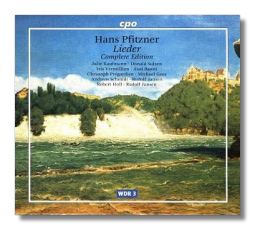
The Internet's Premier Classical Music Source
Related Links
- Latest Reviews
- More Reviews
-
By Composer
-
Collections
DVD & Blu-ray
Books
Concert Reviews
Articles/Interviews
Software
Audio
Search Amazon
Recommended Links
Site News
 CD Review
CD Review
Hans Pfitzner

Complete Lieder
Julie Kaufmann, soprano
Iris Vermillion, mezzo-soprano
Christopher Prégardien, tenor
Andreas Schmidt, baritone
Robert Holl, bass
Donald Sulzen, Axel Bauni, Michael Gees & Rudolf Jansen, piano
CPO 999789-2
Pfitzner is best known for his opera Palestrina, generally regarded as his magnum opus. Clearly his talent lay in the vocal realm, and this massive collection of songs offers further evidence of his rare gifts in that genre.
Pfitzner wrote about one hundred fifteen songs, the earliest ones perhaps somewhat derivative but still effective, while many of the later efforts are among the finest songs from the early-20th century. This latter group can hardly be covered in a review of this limited scope, but, to mention a few here, listeners might want to sample Abbite (Op. 29, #1, on texts by Friedrich Hölderin), with its weird opening chord and subtle gloom, and, from the same set, Willkomen und Abschied (#3, on texts by Goethe), a subtly atmospheric song in its racing accompaniment and vibrant vocal line in the first half, and profound and finally ecstatic manner in the latter half.
Also, one might want to try Das Alter, #3 from the Op. 41 Three Sonnets, with its strange, imaginative march-like accompaniment, a most effective background for the Eichendorff's poem about old age. Danzig, #1 from the 1907 Op. 22 set of five songs – actually not a late work – is hypnotic in its ethereality and darkness. Again the text is from Eichendorff.
Pfitzner's earliest efforts here cannot be dismissed, even if they are not quite on the inspired level of the later songs. Kuckuckslied (text by Mary Graf Bartholomew) discloses the burgeoning talent of the teenaged Pfitzner, showing his grasp of humor and color in his portrayal of a cuckoo. Both the theme and the "cuckoo" effects are imaginative and quite charming. The relative depth in the dark Naturfreiheit (#3 of the Jugendlieder, on texts by Ludwig Uhland) is rather impressive from the young composer. True, the contrast that comes when the tempo increases and the mood brightens sounds a bit out of place, but overall the song is still attractive.
Among his very best early songs must be counted An den Mond, a setting of a Goethe poem and the only item in Op. 18. The music is mesmerizing in its mystery and brewing tension, with accompaniment that, if not particularly adventurous, is at least effectively atmospheric. In fact, this entire song, lasting here over seven-and-a-half minutes, is riveting in its dark atmosphere and imagery, and in certain ways is actually Impressionistic. The composer also fashioned an orchestral version of this song.
As for the singers, all are never less than compelling. Schmidt's way with An den Mond, for example, is intense and slow, allowing greater depth to emerge. Fischer-Dieskau turned in a slightly faster account on Orfeo, but may not have converted that quicker tempo into greater intensity. Julie Kaufmann has an attractive voice that can catch the more ponderous sentiments – try her Ich und du, #1 from Op. 11 – and the livelier and charming side of the composer, as heard, for example, in Sonst, #4 from Op. 15.
Bass Robert Holl sings brilliantly throughout, but does not appear on the first three discs in the collection. In the aforementioned Willkomen und Abschied he finds many nuances of expression and great depth and color. Iris Vermillion perfectly captures the melancholy and bleakness in An die Mark, #3 from Op. 15, on texts by Ilse von Stach. Last but not least among the singers is the tenor Christopher Prégardien. His rendering of Herbstbild, #1 from Op. 21, on texts by Friedrich Hebbel, is sensitive and atmospheric in expressing the eerie autumnal character of Hebbel's poem. And, as with Holl and the others, one could cite many other fine performances in this collection by this artist.
What of the accompanists here? Not in any way to slight the singers, who are excellent as already noted, but the pianists may divulge a slightly greater consistency in their artistry. Each is brilliant, never sounding too deferential or ever even remotely attempting to steal the show. All demonstrate a sense for atmosphere and nuance, for subtlety and color. One can only wish that all singers would be blessed with such partners in their recitals. The sound provided by CPO is open and detailed, with voices and piano in proper balance. The notes in each of the five album booklets are informative and texts are given in the original German and in English. To those with an interest in Lieder, or to those wanting to sample a vein in the vocal realm that is slightly out of the mainstream, this collection is strongly recommended.
Copyright © 2001, Robert Cummings



















